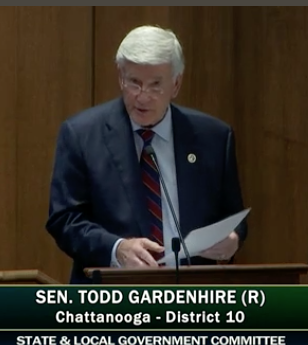House, Senate pass bill requiring clear agendas for local legislative body meetings

Sen. Todd Gardenhire, R-Chattanooga, explains the bill that would require local legislative bodies to have clear and detailed agendas for upcoming meetings.
The House and Senate have both passed on unanimous votes a bill that sets a new standard in Tennessee on the availability and clarity of agendas for county commissions and local municipal governing bodies. The bill now heads to the governor’s office where it will become law upon his signature.
The legislation requires that local government legislative bodies, which include city councils, boards of aldermen and county commissions, make their agendas for upcoming meetings available 48 hours prior to the meeting in a place accessible to the public. This can include the governing body’s website.
Agendas must ‘reasonably describe’ all items
“The agenda must reasonably describe matters to be deliberated and acted upon during the meeting,” the legislation says.
Tennessee Coalition for Open Government brought the proposal to the Senate and House sponsors, Sen. Todd Gardenhire, R-Chattanooga, and Rep. Jerome Moon, and worked with the Tennessee Municipal League and County Services Association on the final language in the amendment that passed.
“Citizens need to know what their local governing body plans to vote on before the meeting, not after,” said Gardenhire in presenting the bill to a Senate committee. “This allows them to contact their representative in advance or attend the meeting if they want.”
“This is an open government bill that is needed in Tennessee,” he said.
Several lawmakers signed onto the bill (SB27 / HB 23), including senator Ferrell Haile and Ken Yager and House members Esther Helton-Haynes, Darren Jernigan, Iris Rudder, Jeremy Faison, Greg Martin, Russ Bricken, Chris Todd, Andrew Farmer, William Lamberth, Rusty Grills, Greg Vital, Rick Eldridge, Dave Wright, John Ray Clemmons, Dan Howell and John Ragan.
Courts have pointed to lack of statute requiring agendas
The genesis for TCOG’s interest in the bill was a series of Court of Appeals rulings beginning in 2013 that the “adequate notice” requirement for meetings in the Open Meetings Act required “only notice of the meeting itself and does not speak to notice of the content of the meeting.”

Rep. Jerome Moon, R-Maryville, was the House sponsor of the bill to require agendas for local legislative bodies.
“We note that the legislature could have defined ‘adequate public notice,’ but did not and has not since the statute was enacted in 1974. Had the legislature intended to require notice of the agenda for every meeting, whether regular or special, it could have said so at any time during the last 39 years,” the Court of Appeals said in Fisher et al. v. Rutherford County Regional Planning Commission in 2013.
While the Tennessee Supreme Court has ruled that the public notice for special-called meetings must include the purpose of the meeting or the action proposed to be taken, Tennessee courts have continued to refer to the Fisher case and rule that no such requirement is necessary for regular meetings.
A recent example of such an interpretation was in Gray v. Dickson County. In that case, the county did not include on its agenda the discussion or vote on a controversial settlement agreement regarding a site plan for a fuel terminal that was opposed by many citizens. In addition, some citizens had called the county offices prior to the meeting asking if the agreement was on the agenda and were told it was not.
The county commission ended up adding the item during the meeting and voting.
In deciding whether the county violated the adequate notice provisions of the open meetings law, the court referred again to the Fisher case and said in its analysis that “(a) published agenda is not a required component of adequate notice for a regular meeting under the Open Meetings Act.”
Withholding agenda items to avoid disclosure would violate law
While the new provision allows a governing body to “deliberate or act upon matters not listed on the agenda if the local government legislative body follows its bylaws or properly adopted rules and procedures and complies with all other applicable state laws,” it also has a provision that prohibits the governing body from circumventing “the spirit or requirements of this section by withholding items from an agenda for the purpose of avoiding public disclosure of business to be considered by the legislative body.”
Enforcement would be through the litigation provision already in the open meetings law that requires a court to make written findings of fact and conclusions of law. Such lawsuits can involve depositions of individual governing body members in an effort to determine the facts of an alleged violation.
A judge can nullify actions taken by a governing body in violation of the open meetings law. The law also requires that a person found to violate the open meetings law be permanently enjoined from further open meetings violations.
Other states have agenda requirements
Many other states have either specific state laws or a court interpretation of the state’s adequate notice laws that require agendas to be available to the public before a meeting. Most of the statutes also address the clarity of agendas to prevent a governing body from hiding an item of wide community interest with vague language.
Some states with such laws include Alabama, Georgia, Florida, Indiana, Nevada, Missouri, New Mexico, Oklahoma and Pennsylvania.
Controversies over agendas have tended to be over when they become available to the public and the detail and clarity of the items listed. For example, in 2019, the Nashville Metropolitan Development and Housing Agency told a Metro Council committee that it would improve what it shares with the public on its meeting agendas after complaints that the agendas, while online, had little information to what was actually to be discussed or decided upon.
Senator gives example of vague agenda items
Gardenhire spoke to the clarity of agendas during his presentation of the bill in the Senate State and Local Government Committee meeting on March 29, saying that even before TCOG contacted him about the legislation, a mayor of a local community in his district had complained about agendas of a governing body that had vague language for approval of funds on the consent agenda.
“Approval for advance of funds of general purpose funding …, request of approval of payment to a construction company,” Gardenhire read from the agenda. “All these things were on the consent calendar where the public had no knowledge about what’s inside these particular things. This is the type of — I don’t want to say abuse — just things that have gone on in the past and they’ve always done it that way.
“But they need to be a little bit more disclosed and they need to put it on the website if possible.”
Sen. Richard Briggs, R-Knoxville, who is chairman of the State and Local Government Committee, said in the hearing that he understood that 11 counties do not have websites and asked if those without a website would be allowed under the bill to have the agenda in the county commission’s office.
Because the bill requires only that the agenda be in a place “accessible to the public,” it likely would allow an agenda to be in a county building as long as that building was open and accessible to the public.




